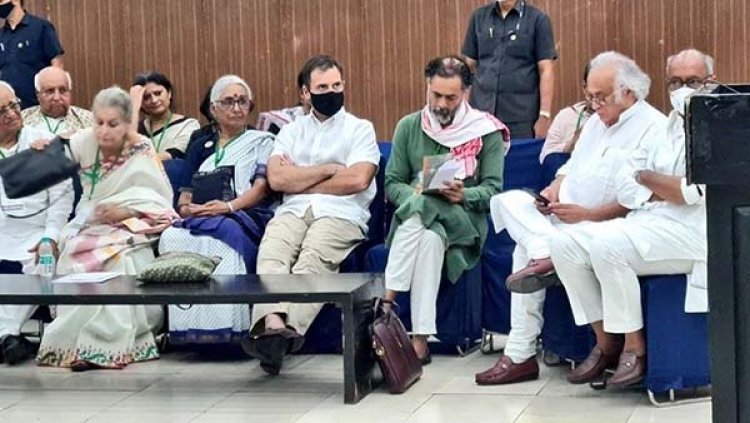You saw a new Rahul Gandhi in Parliament | I saw the change in Kashmir itself
As the country embraces the new Rahul Gandhi after the Bharat Jodo Yatra, the Congress leader cannot but embrace the challenge of practising politics in these dark times.

Yogendra Yadav :
With Bharat Jodo Yatra, Rahul Gandhi has earned what he inherited. This is good news not just for his political career and for the electoral fortunes of the Congress party. This may be good news for the future of India as well.
This week the country saw a new Rahul Gandhi. Unlike his solo and strident attack on the Rafale scam before the 2019 Lok sabha election, his interrogation of PM Narendra Modi’s complicity in the Adani affair was at once sharper and calmer. This was not a piece of classical oratory. But he took on the BJP hecklers with a refreshing self-assurance that he had the facts of the case, his own party and the public to back him. Notwithstanding the ham-handed attempts by the darbari media to hush up this international scandal, it is already clear that the charge of Adani-Modi nexus is going to travel a long way.
I had seen this new Rahul Gandhi earlier. If you want a date, I would name 30th of January, the concluding function of the Bharat Jodo Yatra in Srinagar. “There is a 90 percent chance of rain or snow during the final public meeting,” Rahul Gandhi’s close associate KB Byju had informed me a couple of days ago. And how right the forecast was. Srinagar was already freezing cold. Heavy snow had started in the early hours of the day. By the time we reached the Sher-i-Kashmir Stadium, we were walking through snow, slush and mud to reach the podium. As if on cue, bigger and faster snowflakes started descending as the meeting began.
My snowshoes had already given in, soaking my feet in freezing water. I discovered that my newly acquired fancy warm jacket (guaranteed to withstand minus 5 degrees, it said) was not waterproof. And the podium was not covered. Rahul Gandhi had decreed that if there is no cover for the public, there should be none for the leaders too. As it turned out, the few hundred people who braved everything to attend the meeting were smarter than the leader, as a majority of them had brought sturdy umbrellas. So the entire leadership, many of them from Tamil Nadu, practised tapasya during snowfall. Rahul Gandhi shot down any suggestions of trimming the number of speakers. It was well over an hour before it was his turn to speak.
The moment of Rahul Gandhi’s arrival
The first thing Rahul Gandhi did on reaching the podium was to wave off the person who held an umbrella for the speakers. And then he spoke, calmly, chewing on his words for the next 40 minutes. He spoke about the purpose of the just concluded yatra. He spoke about how the yatra diminished his ahankara, his pride in his physical prowess, and how a young girl’s letter gave him the strength to go on. Now clad in a Kashmiri phiran and a woollen cap, he spoke about his T-shirt and how meeting three street children gave him that resolve to face cold. He spoke about his family’s Kashmir connection and how Kashmiri spiritual tradition blends with that of Assam, Karnataka, and Maharashtra.
And then he took out his phone from his pocket and spoke about what a phone call meant in his life. The phone call in his school that brought him the news of his grandmother being shot dead. The phone call in his college that announced his father’s assassination. He connected it with many such phone calls that go out to the children of our jawans serving in the security forces or to the families of people in Kashmir. The purpose of this yatra, Rahul Gandhi said, is to stop these phone calls.
There was no melodrama, no raising or choking of voice. There was no oratorical flourish in his speech. Absolutely none. There was very little “political” content, except a passing reference to Modi-Shah-Doval who would never understand the trauma of these phone calls. There was no political strategy, no targeting of social groups, no smart attack on his opponents, no clever jumlas. There was no trace of the much-awaited announcement regarding the plan of action after the Bharat Jodo Yatra, something that so many of us waited for. As always, he ended the speech just when everyone expected him to say something more.
On that freezing day, Rahul Gandhi offered something simple and warm that every Indian inside and outside the Valley could hold on to. A vision of what India could have been and can still be. He stated this with a simplicity that can only come from inner peace and clarity. He exuded warmth that can only emerge from purity of heart. He spoke with a calm that reflected a deep resolve. That was not a speech I expected, or indeed wanted, Rahul Gandhi to deliver at the end of a 3,700-km-long yatra. Yet, in a flash, I could see that this speech was better than anything that anyone could have scripted.
Pappu vs Rahul Gandhi
Ironically, the pappu image has turned into Rahul Gandhi’s biggest asset. The caricature was so completely off that Rahul Gandhi had to just step out in sunlight for everyone to register the mismatch between the image and the man.
Pappu was a classic Delhi babalog who could not take the heat and dust of this country a day. The first few days of walking 25 km a day was enough to shred this image. The famed ‘IT Cell’ was left with no option except to peddle a low-grade lie that Rahul Gandhi was actually not walking. Pappu was an entitled and snooty brat who wouldn’t deign to speak to anyone. The avalanche of photos and videos of Rahul Gandhi holding hands, speaking with and hugging all and sundry razed that lie to the ground.
Finally, pappu was the idiot who knew nothing about our country and its people. The contrast could not be sharper for the hundreds of activists and intellectuals who met Rahul Gandhi during the Bharat Jodo Yatra. Nearly everyone was taken aback, if not floored, by Rahul Gandhi’s intellectual depth, thanks to the pappu image they came with.
Pappu eventually backfired on its creators. The real Rahul Gandhi has stepped out of the poster. A man of deep convictions, who genuinely believes in the constitutional ideals of secularism, social justice and economic equality. A thinking mind who reflects not just on problems facing the country and the world, but awho can turn the mirror inwards. A humane leader who lives by and practises compassion, who has worked hard to overcome hatred. A politician who is not power hungry. A straightforward person who abjures drama and lies. The contrast with Narendra Modi could not be sharper.
Rahul Gandhi’s challenge moving forward
Yet each of these virtues has a possible flip side. Convictions can turn into obstinacy. Vision can become other-worldly. Tapasya (penance) can have its own ahankar (ego). Absence of lust for power can degenerate into lack of will to power. This is the challenge of ethical politics.
A visionary runs the risk of being cut off from the world of political reality, unless there is a way to turn what is ethical into politically viable. Rahul Gandhi faces the challenge of translating his vision, indeed the constitutional vision, into values that are shared by Congress leaders, Congress workers and the people of India. He has to unite the Congress with its own soul. Not being power hungry is a virtue, but not having the will to power for the right cause is abdication of responsibility. Rahul Gandhi faces the challenge of using his newly acquired stature within his own party to shape it up as an efficient election machine and lead it to victory. In a world where everyone believes that you need to lie in order to sway the masses, Rahul Gandhi faces the challenge of communicating truth in a way that touches the people’s heart.
Rahul Gandhi realises too well that politics is not about holding up a banner of virtues; it is about realising those virtues in the real, messy world that we live in. That is not just a challenge for Rahul Gandhi or opposition parties like the Congress; it’s a challenge for anyone who stands for the Republic of India. As the country embraces the new Rahul Gandhi, he cannot but embrace the challenge of practising politics in these dark times.

















